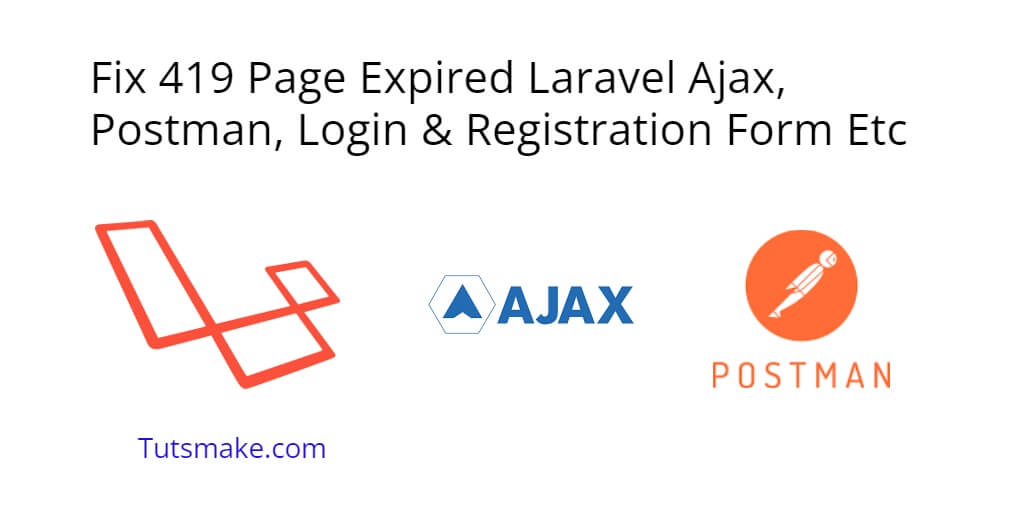If you are working with a form like login, registration, etc, and submitting it to the Laravel app using Ajax and Postman API. and you have not added csrf token in it then you will get errors as follows, 419 page expired laravel ajax, laravel 419 page expired postman, 419 page expired laravel login, Laravel 419 page expired redirect to login, Laravel 419 page expired CSRF , et cetera.
So, Through this tutorial, you will learn how to fix laravel 419 pages expired error in laravel 10, 9, 8 versions.
How to Fix 419 Page Expired in Laravel 10, 9, 8
419 Page Expired error in Laravel 10, 9, 8 using ajax post request, Postman with apis, and login & registration, etc form submit. To resolve this error, you have the following options:
- Solution 1 – 419 Page Expired Laravel Post Login, Registration, etc Form
- Solution 2 – 419 Page Expired Laravel Ajax
- Solution 3 – 419 Page Expired Laravel Postman Apis
- Solution 4 – Remove CSRF protection on specific URL
Solution 1 – 419 Page Expired Laravel Post Login, Registration, etc Form
In this first solution, To fix 419 page expired error in Laravel, you need to add @csrf with your laravel login, registration, etc forms.
So, open your login or registration blade view file and add the following line of code into your blade view file head section:
<form method="POST" action="/profile">
@csrf <!-- add csrf field on your form -->
...
</form>
Solution 2 – 419 Page Expired Laravel Ajax
To fix/solve 419 page expired laravel ajax, Make sure you include the CSRF token in your Ajax request headers or data in laravel project. The CSRF token is typically stored in a meta tag within your HTML template. If you do not include it, and you are getting 419 page expired laravel or laravel csrf token mismatch ajax. Here’s an example of how to include the CSRF token in your Ajax request headers using jQuery:
So, open your blade view file and add the following line of code into your blade view file head section:
<head>
<meta name="csrf-token" content="{{ csrf_token() }}">
</head>
Now, you can see the following how to send csrf token with your form data using ajax in laravel:
$.ajax({
type: "POST",
url: '/your_url',
data: { somefield: "Some field value", _token: '{{csrf_token()}}' },
success: function (data) {
console.log(data);
},
error: function (data, textStatus, errorThrown) {
console.log(data);
},
});
OR
$.ajaxSetup({
headers: {
'X-CSRF-TOKEN': $('meta[name="csrf-token"]').attr('content')
}
});
Solution 3 – 419 Page Expired Laravel Postman Apis
When encountering a “419 Page Expired” error in Laravel while using Postman, it typically indicates an issue with CSRF (Cross-Site Request Forgery) protection. Laravel’s default CSRF protection requires a valid CSRF token to be included with each POST request. To resolve this error, you need to follow the following steps:
If you prefer to keep CSRF protection enabled, you need to include the CSRF token with your POST requests in Postman. Here’s how:
- Send a GET request to the endpoint you’re testing in Postman. Make sure it’s a route that requires authentication.
- Inspect the response headers for the
Set-Cookieheader. It should contain a cookie namedXSRF-TOKENwith the CSRF token value. - Copy the value of the
XSRF-TOKENcookie. - In Postman, go to the Headers tab for your POST request.
- Add a new header with the key
X-XSRF-TOKENand paste the CSRF token value as the header value. - Send the POST request again, and the “419 Page Expired” error should be resolved.
Solution 4 – Remove CSRF protection on specific URL
To disable CSRF protection field for all routes group or specific routes in laravel. So, visit app\Http\Middleware\ directory and open VerifyCsrfToken.php file. Then add the following lines of code in it:
<?php
namespace App\Http\Middleware;
use Illuminate\Foundation\Http\Middleware\VerifyCsrfToken as BaseVerifier;
class VerifyCsrfToken extends BaseVerifier
{
protected $except = [
'payment/*', // routes group
'specific-route', // specific route
];
}
Conclusion
That’s all; Through this tutorial, you have learned how to fix laravel 419 page expired error in laravel 10, 9, 8, 7 versions.
